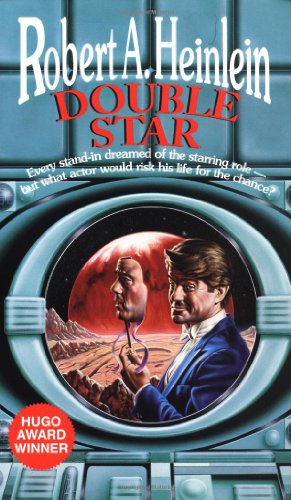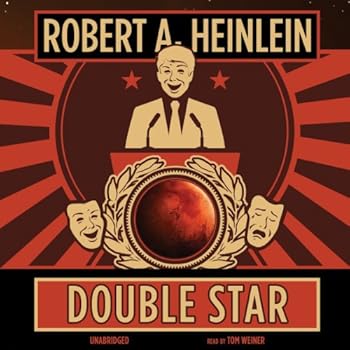
![]() Double Star by Robert A. Heinlein
Double Star by Robert A. Heinlein
Most of Robert A. Heinlein’s adult novels have interesting ideas or premises but many lack likeable characters and/or fun quickly-moving plots. Fortunately Double Star has all the right elements and is entertaining from start to finish. It’s one of Heinlein’s best novels, I think, and I must not be alone in that opinion since it won the Hugo Award in 1956 and was nominated for Locus’ All-Time Best Science Fiction Novels. Double Star is a character-based novel that explores some important political issues without getting preachy.
Lorenzo Smythe, who styles himself “The Great Lorenzo,” is a down-and-out actor who has a lot more self-esteem than he has job offers. In fact, he’s a pompous ass and nobody wants to hire him. Just after he’s spent his last penny, he’s offered an acting job that pays a lot more money than he’s ever been offered before. He will be playing the double of a famous politician on Mars. Lorenzo fancies himself an artist, so even though he disagrees with the man’s politics, he gives the role everything he’s got. All he really cares about is giving a great show.
 Lorenzo studies diligently for his new role as the popular, hard-working and ethical politician and it changes his life. Not only is this fun to watch, but the story made me think about the mutability of personality and how someone might become a better person simply by acquiring the habit of acting like a better person. It also made me think about how we often misunderstand and malign people whose politics or religion we don’t agree with. If we really got to know them and to understand what they believe and why, we might find ourselves understanding and admiring them despite our differences in opinion. Another theme in Double Star is the sense of self and what it means to lose that sense. I don’t want to say too much so as not to ruin the plot, but I found myself thinking about this — struggling with it, actually — long after I finished the book.
Lorenzo studies diligently for his new role as the popular, hard-working and ethical politician and it changes his life. Not only is this fun to watch, but the story made me think about the mutability of personality and how someone might become a better person simply by acquiring the habit of acting like a better person. It also made me think about how we often misunderstand and malign people whose politics or religion we don’t agree with. If we really got to know them and to understand what they believe and why, we might find ourselves understanding and admiring them despite our differences in opinion. Another theme in Double Star is the sense of self and what it means to lose that sense. I don’t want to say too much so as not to ruin the plot, but I found myself thinking about this — struggling with it, actually — long after I finished the book.
Heinlein loves to talk politics and this story is the perfect set-up for him to explore moral issues such as pacifism, racism and, of course, taxes. Most of the plot involves political campaigning and I was amused by how differently this is done today compared to 1956 when Double Star was published. If this story was updated for 2013, the political campaigning process is what would require the most editing!
I listened to audiobook version narrated by Lloyd James and produced by Blackstone Audio. James did a great job with Lorenzo. If you’re an audiobook reader, I recommend this version.
~Kat Hooper

![]() In Double Star, a 1956 Robert Heinlein novella, Lawrence Smith (aka “Lorenzo Smythe” or “The Great Lorenzo”) an out-of-work actor, accepts a job to impersonate a man for a few days, without, perhaps, asking as many questions about the job as he should have. Larry promptly finds himself whisked off to the planet Mars, standing in for the Honorable John Bonforte, one of the most important political figures in the solar system, who has been kidnapped. His first task: double for Bonforte during a vitally important Martian adoption ceremony, where failure to appear is not an option unless you’re dead. But somehow one appearance as a double leads to another, and another…
In Double Star, a 1956 Robert Heinlein novella, Lawrence Smith (aka “Lorenzo Smythe” or “The Great Lorenzo”) an out-of-work actor, accepts a job to impersonate a man for a few days, without, perhaps, asking as many questions about the job as he should have. Larry promptly finds himself whisked off to the planet Mars, standing in for the Honorable John Bonforte, one of the most important political figures in the solar system, who has been kidnapped. His first task: double for Bonforte during a vitally important Martian adoption ceremony, where failure to appear is not an option unless you’re dead. But somehow one appearance as a double leads to another, and another…
My (self-imposed) mission was to find a Robert Heinlein story where the enjoyment of the tale isn’t swamped by the offensive content for which Heinlein is, unfortunately, well known. Double Star, I think, does the job pretty well. There are a few instances of eyebrow-raising dialogue, and the women mostly have secretarial-type jobs, but nothing was too far out of line, and it’s par for what you’d normally expect to see in 1950’s books (even science fiction books; the imaginations of mid-century SF authors had their limits).
Robert Heinlein gets on his soapbox a little about personal freedoms and politics, but it’s all good since the main message is equality for all races, including Martians and Venerians (aliens from Venus). A few outdated technologies like microfilm and slide rules appear alongside the spaceships and ray guns, but it doesn’t ruin the fun. It’s actually pretty amusing in a retro kind of way.
This is a quick and humorous read, not terribly challenging, but enjoyable. There are some interesting and worthwhile ideas about how acting a role can change you as a person, the importance of the political process, and the impact one person can have.
~Tadiana Jones

![]() Double Star is one of Robert Heinlein’s most enjoyable early period SF novels, a short and tightly-plotted story of out-of-work actor Lawrence Smith (aka “The Great Lorenzo”), who is unexpectedly tapped for a very important acting job, to impersonate an important politician named John Bonforte who has been kidnapped. Initially the job is supposed to be just short-term until the real guy can be rescued, but as things drag out, this becomes more difficult. Even more surprisingly, Lorenzo finds he is actually getting quite good at impersonating Bonforte, and has started to understand and sympathize with his politics as well. But how far can this situation go before somebody blows his cover…
Double Star is one of Robert Heinlein’s most enjoyable early period SF novels, a short and tightly-plotted story of out-of-work actor Lawrence Smith (aka “The Great Lorenzo”), who is unexpectedly tapped for a very important acting job, to impersonate an important politician named John Bonforte who has been kidnapped. Initially the job is supposed to be just short-term until the real guy can be rescued, but as things drag out, this becomes more difficult. Even more surprisingly, Lorenzo finds he is actually getting quite good at impersonating Bonforte, and has started to understand and sympathize with his politics as well. But how far can this situation go before somebody blows his cover…
Published in 1956 and winner of the Hugo Award, this book is perfectly paced, with great supporting characters and plenty of twists and turns. The characteristic Heinlein wit is effortless, and even when he discusses politics, it doesn’t get tiresome. More than anything, what amazing foresight he had. I mean, that would be unthinkable that an action star or second-rate actor could be a governor, or even, God forbid, President of the United States, right?
While Double Star is a great novel, I have mixed feelings about the works of Grand Master of Science Fiction, Robert Heinlein. I couldn’t stand Starship Troopers and Stranger in a Strange Land, but loved The Door Into Summer and Double Star. I found much to admire in The Moon is a Harsh Mistress but also got tired of some of the lecturing. You couldn’t find a more opinionated person on the subjects of politics (liberal and conservative), personal responsibility to society, the military, criticism of organized religion, sexual freedom, libertarianism, very mixed attitudes (both admiring and condescending) towards women, and of course a great enthusiasm for depicting realistic future societies of all kinds.
His early books (haven’t read the juveniles, though I’m sure they were great for young folks growing up in the early 1950s) are really fun, with exciting plots, snarky dialogue, plucky characters, and interesting ideas. His middle stuff gets much further into exploring his ideas about politics, sex and religion, and his later stuff is almost unreadable, bloated, self-indulgent explorations of his own inner obsessions, with a healthy dollop of incest and kinky sex. I’m sure those books would never have been published if they were written by anyone other than Heinlein.
In the end, the SF genre has been enriched immeasurably by the presence of Robert Heinlein, along with his fellow giants Arthur C. Clarke and Isaac Asimov, and the genre will probably never see his like again.
~Stuart Starosta





I remember really liking this one, too, Kat. Thanks for reminding me of why….
This was always one of my favorites, among many well-liked Heinleins.
Been ages since I’ve read it, but this was always one of my favorites by the old guy . . .
Heinlein’s work was a lot more enjoyable before it turned into a soapbox for his eccentricities.
Double Star is the first (and last, so far) Heinlein I’ve read and I found it quite fun, with a plot that wasn’t diminished because of the time period it was written. In my review, I did point out the quaint sexism, which amused me more about than offended. Sexism that blatant would have a hard time getting published. I really love classic Sci-fi, even if their view of the future was sadly inaccurate.
I hadn’t even thought of the amusing foresight in his plot of the second-rate actor becoming polititian!
Kallen, the sexism was fairly quaint in this harmless story, but you’d probably be less forgiving if you read The Puppet Masters or anything from Time Enough For Love onward. He got pretty eccentric and creepy by then. BTW, I enjoyed perusing your GeekyLibrary site. I wish they had some SF conventions here in Tokyo, but that’s unlikely to happen.
Although usually filed under SF, Double Star is the best novel ever written about the theater and acting. Period. Full Stop. Eclipse first and the rest nowhere. Not bad on politics, either.